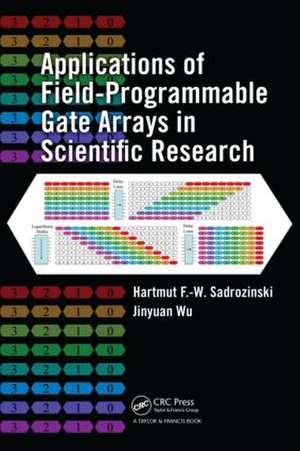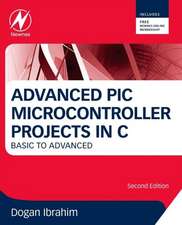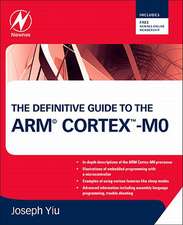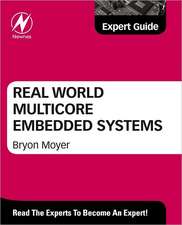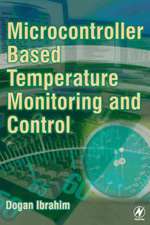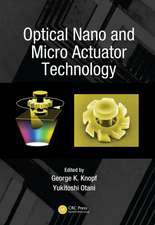Applications of Field-Programmable Gate Arrays in Scientific Research
Autor Hartmut F.-W. Sadrozinski, Jinyuan Wuen Limba Engleză Hardback – 7 dec 2010
The book first describes various FPGA resources, including logic elements, RAM, multipliers, microprocessors, and content-addressable memory. It then presents principles and methods for controlling resources, such as process sequencing, location constraints, and intellectual property cores. The remainder of the book illustrates examples of applications in high-energy physics, space, and radiobiology. Throughout the text, the authors remind designers to pay attention to resources at the planning, design, and implementation stages of an FPGA application, in order to reduce the use of limited silicon resources and thereby reduce system cost.
Supplying practical know-how on an array of FPGA application examples, this book provides an accessible overview of the use of FPGAs in data acquisition, signal processing, and transmission. It shows how FPGAs are employed in laboratory applications and how they are flexible, low-cost alternatives to commercial data acquisition systems.
Web Resource
A supporting website at http://scipp.ucsc.edu/~hartmut/FPGA offers more details on FPGA programming and usage. The site contains design elements of the case studies from the book, including VHDL code, detailed schematics of selected projects, photographs, and screen shots.
| Toate formatele și edițiile | Preț | Express |
|---|---|---|
| Paperback (1) | 446.16 lei 6-8 săpt. | |
| CRC Press – 12 sep 2017 | 446.16 lei 6-8 săpt. | |
| Hardback (1) | 1001.21 lei 6-8 săpt. | |
| CRC Press – 7 dec 2010 | 1001.21 lei 6-8 săpt. |
Preț: 1001.21 lei
Preț vechi: 1220.98 lei
-18% Nou
Puncte Express: 1502
Preț estimativ în valută:
191.64€ • 208.24$ • 161.08£
191.64€ • 208.24$ • 161.08£
Carte tipărită la comandă
Livrare economică 21 aprilie-05 mai
Preluare comenzi: 021 569.72.76
Specificații
ISBN-13: 9781439841334
ISBN-10: 1439841330
Pagini: 170
Ilustrații: 2-pg/2-fig color insert follows page 82; 17 equations; 2 Tables, black and white; 2 Illustrations, color; 91 Illustrations, black and white
Dimensiuni: 156 x 234 x 11 mm
Greutate: 0.48 kg
Ediția:1
Editura: CRC Press
Colecția CRC Press
ISBN-10: 1439841330
Pagini: 170
Ilustrații: 2-pg/2-fig color insert follows page 82; 17 equations; 2 Tables, black and white; 2 Illustrations, color; 91 Illustrations, black and white
Dimensiuni: 156 x 234 x 11 mm
Greutate: 0.48 kg
Ediția:1
Editura: CRC Press
Colecția CRC Press
Public țintă
Researchers and graduate students in electronics, electrical engineering, high energy physics, sensors, biology, signal processing, aerospace, defense systems, medical imaging, computer vision, speech recognition, cryptography, bioinformatics, hardware emulation, astronomy, biophysics, and computer engineering.Cuprins
Introduction. Understanding FPGA Resources. Several Principles and Methods of Resource Usage Control. Examples of an FPGA in Daily Design Jobs. The ADC + FPGA Structure. Examples of FPGA in Front-End Electronics. Examples of an FPGA in Advanced Trigger Systems. Examples of an FPGA Computation. Radiation Issues. Time-over-Threshold: The Embedded Particle-Tracking Silicon Microscope (EPTSM). Appendix. Index.
Notă biografică
Hartmut F.-W. Sadrozinski is a research physicist and adjunct professor at the University of California, Santa Cruz. A senior fellow of the IEEE, Dr. Sadrozinski has been working on the application of silicon sensors and front-end electronics in elementary particle physics and astrophysics for over 30 years. He is currently involved in the use of silicon sensors to support hadron therapy. He earned his Ph.D. from the Massachusetts Institute of Technology.
Jinyuan Wu is an electronics engineer in the Particle Physics Division of Fermi National Accelerator Laboratory. Dr. Wu is a frequent lecturer at international workshops and IEEE conferences. He earned his Ph.D. in experimental high energy physics from Pennsylvania State University.
Jinyuan Wu is an electronics engineer in the Particle Physics Division of Fermi National Accelerator Laboratory. Dr. Wu is a frequent lecturer at international workshops and IEEE conferences. He earned his Ph.D. in experimental high energy physics from Pennsylvania State University.
Descriere
Focusing on resource awareness in field-programmable gate array (FPGA) design, this work covers the principle of FPGAs and their functionality. It provides an accessible overview of the use of FPGAs in data acquisition, signal processing, and transmission and contains many hands-on examples drawn from diverse fields, such as high-energy physics and radiobiology. The authors emphasize sound design practices that encourage the saving of limited silicon resources and power consumption. They also offer VHDL code, detailed schematics of selected projects, photographs, and more on a supporting website.
